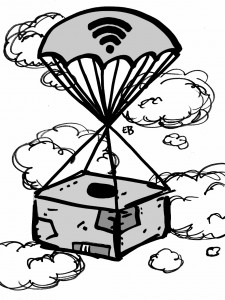Getting internet to a country that barely has running water can be a tough problem. Cell phones have proven to be less of one – even in the most underdeveloped nations, cell ownership is rapidly expanding for communications and basic networking tasks.
A similar expansion of internet access to poor regions has been targeted by aid groups in recent years as one of the most efficient means of improving quality of life. The information available through the web can be used for everything from health care to crop yields. But despite international aid progression, and the apparent universality of the net to those living in the U.S. and other wealthy countries, global internet use is still restricted to only a third of the world’s population.
That leaves 5.4 billion people who have yet to ever use a search engine, who have grown up without social networks or online shopping. Five billion people is a big market, and with this in mind, many web companies have joined the cause of bringing the internet to everyone.
The line is a bit blurred when deciding whether a company like Google investing in globally pervasive internet is doing it for charity or for profit. But the hybrid set of motivations has given them plenty of justification to pour millions of dollars into the task.
“Project Loon” started off as a low profile experiment based on using balloons as internet hotspots but has since expanded to the purchase of 130 low-orbit satellites and the unmanned aircraft firm Titan Aerospace. The Californian tech giant now aims to deliver web use over the skies of Africa and Asia using eternally airborne solar drones, broadcasting out the boon of technology under the command of their space-bound counterparts.
But Google isn’t alone in approaching the problem. Facebook – along with a host of other companies like Samsung, Nokia, Qualcomm, Mideatek, and Ericsson – have all teamed up to create internet.com, a collaborative initiative to transform the web from a privileged commodity to a globalized utility.
While at first glance this younger project contains a lot of similar goals to Google’s Loon initiative – such as the use of solar drones as broadcasting stations in regions where cell towers or ground lines are impossible – it is substantially broader in scope. Ideas have ranged from extremely cheap semi-smartphones with web connectivity to increasing data efficiency so that transmission protocols become more viable.
While there’s certainly some profit motive involved when so many companies band together on a single cause, the initiative could be universally beneficial. Studies have shown that internet access creates 2.6 jobs for every 1 it removes, accounting for 21 percent of GDP growth in countries with access. “The knowledge economy is the future,” Mark Zuckerberg wrote in a paper that describes internet access not as a commodity but as a basic human right.
If these far reaching measures succeed, global internet may be something that everyone, from an impoverished worker in a developing economy to a global CEO, can agree on. And who knows what the culture of the web will look like when the remaining five billion people on the planet get online.
Copeland is a member of the class of 2015.






